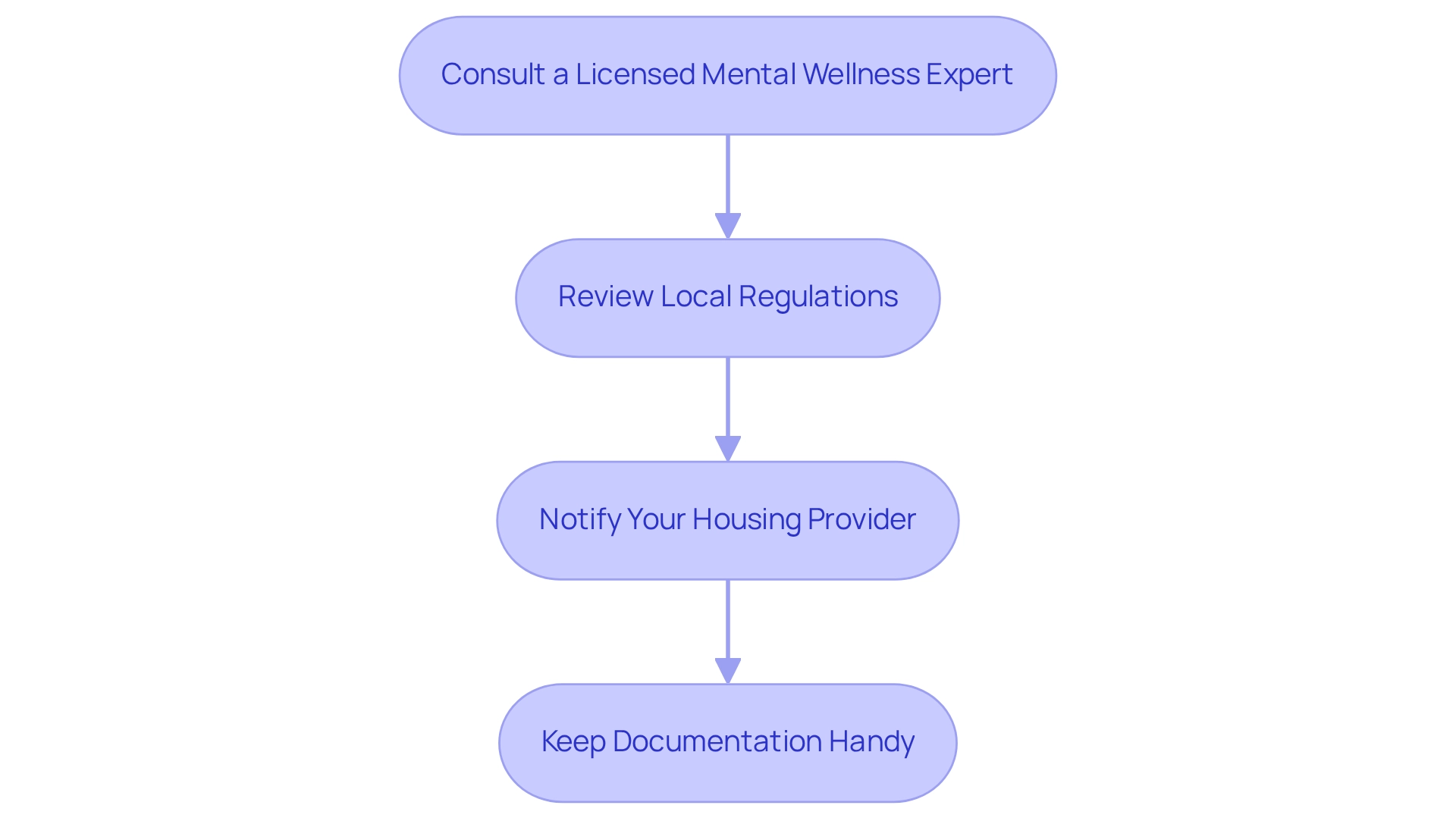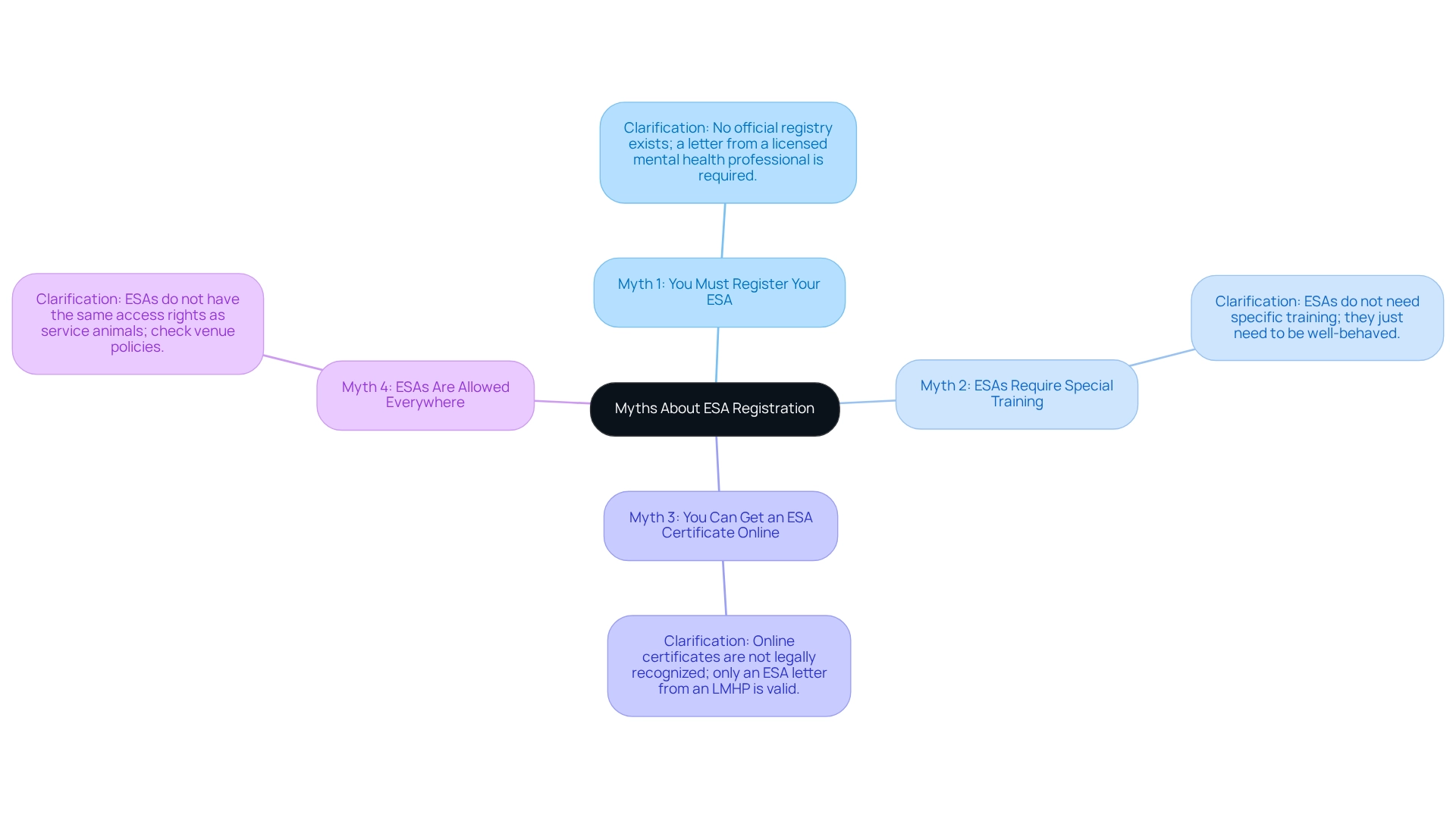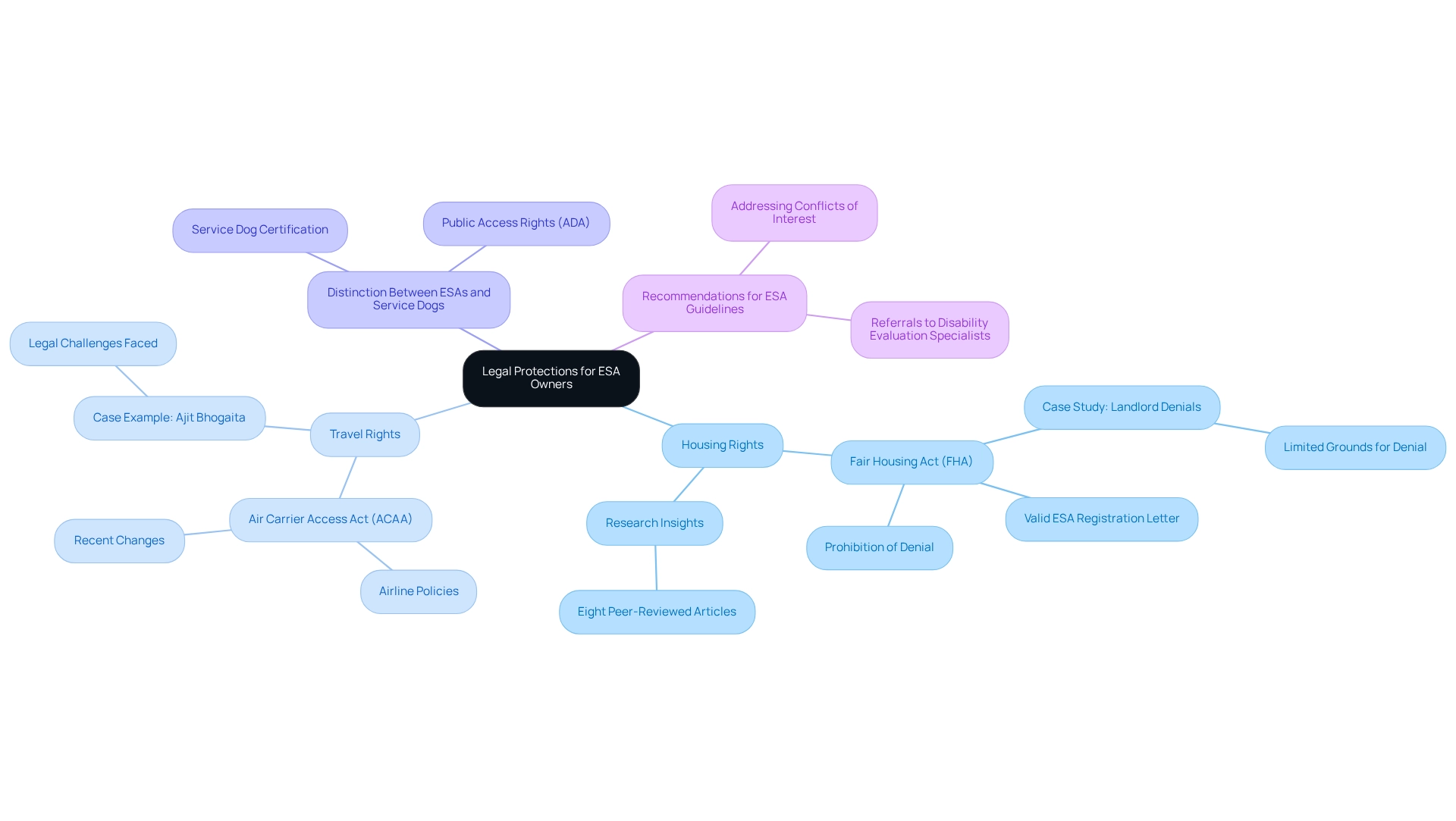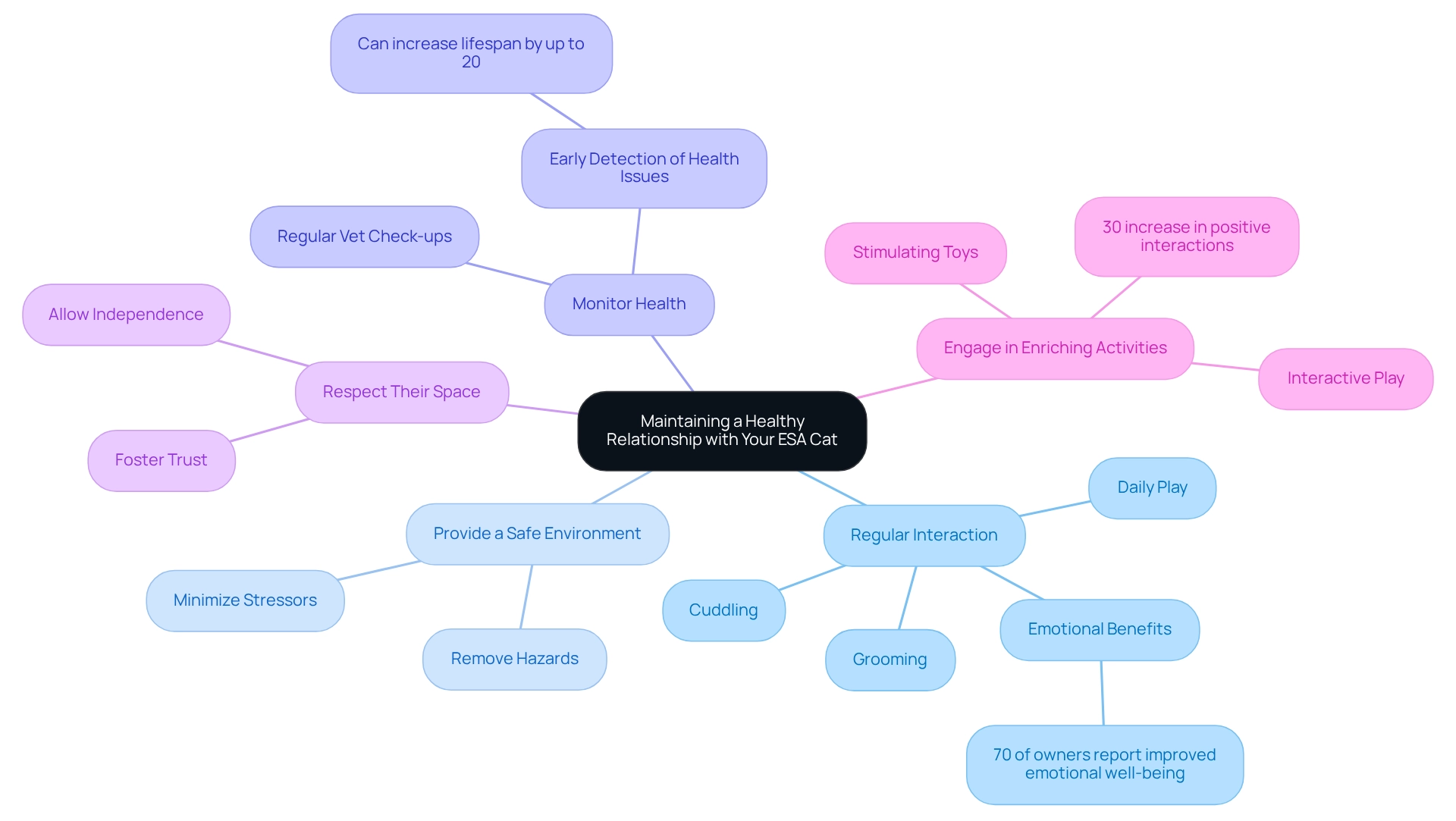

How to Register Your Cat as an ESA: A Step-by-Step Guide
by Lena Park
Last updated: July 9, 2025
Verified and Approved by:
Angela Morris,
MSW, LCSW
Fact Checked

Overview
If you’re considering registering your cat as an Emotional Support Animal (ESA), it’s essential to first consult a licensed mental wellness professional (LMWP). They can evaluate your mental health needs and provide an ESA letter if it’s deemed beneficial for you. This formal documentation is not just a piece of paper; it plays a crucial role in helping you access housing and travel accommodations. Moreover, understanding local regulations and maintaining proper records is vital in advocating for your rights as an ESA owner.
Navigating mental health challenges can be overwhelming, and having an ESA can offer significant emotional support. The process may seem daunting, but remember that you are not alone. Many individuals have found comfort and companionship through their ESAs, enhancing their overall well-being. This is why obtaining that ESA letter is so important—it validates your need for support and helps ensure you receive the accommodations you deserve.
As you embark on this journey, take a moment to reflect on your own experiences and feelings. How might an ESA improve your daily life? By acknowledging your struggles and seeking the support you need, you are taking a courageous step towards healing. Remember, there is a community out there ready to support you, and you deserve to feel cared for and understood.
Introduction
In a world where emotional well-being is increasingly recognized as essential, Emotional Support Animals (ESAs) have emerged as vital companions for individuals facing mental health challenges. Many individuals struggle with feelings of loneliness, anxiety, or depression, and the presence of an ESA can provide a source of comfort and companionship. Among these furry allies, cats hold a special place. They offer warmth and companionship without the rigorous training required of service animals.
This article delves into the eligibility criteria for registering a cat as an ESA, the process involved, and the essential documentation needed to ensure that these feline friends can provide the emotional support their owners require. With a growing body of research highlighting the therapeutic benefits of animal companionship, understanding the nuances of ESA registration is crucial for those seeking to enhance their mental health support system.
Imagine coming home after a long day, feeling the weight of the world on your shoulders. A gentle purr and a soft nuzzle from your cat can make all the difference. These moments of connection remind us that we are not alone in our struggles. As we explore the process of registering a cat as an ESA, let us embrace the understanding that these beloved companions can play a significant role in our emotional well-being.
Understanding Emotional Support Animals: Eligibility for Cats
Support Animals (ESAs) play a crucial role in offering comfort and assistance to individuals encountering mental or psychological challenges. For those seeking ESA cat registration, it is essential that a cat be prescribed by a licensed mental wellness professional (LMWP) as part of a treatment plan for a diagnosed mental condition, such as anxiety, depression, or PTSD. Many individuals facing mental wellness conditions report significant improvements in their well-being when utilizing emotional support animals. In fact, studies reveal that over 70% of those grappling with anxiety and depression find their ESAs to be beneficial in managing their symptoms.
Unlike service animals, which require specialized training to perform specific tasks for individuals with disabilities, ESAs do not have such requirements; however, they must be well-behaved and non-aggressive. The determination of whether a cat meets the criteria for an ESA necessitates a comprehensive assessment by a licensed mental care expert. This professional evaluates the person’s psychological needs and the possible therapeutic advantages of the animal, ensuring that the ESA is a legitimate part of the individual’s treatment plan.
At Wellness Wag, we prioritize client privacy and comply with the Health Insurance Portability and Accountability Act (HIPAA) to safeguard your medical information throughout the ESA certification process. We encourage you to review our Notice of Privacy Practices, which describes how we may use and disclose your Health Information. If you have questions or concerns about this Privacy Policy, please feel free to reach out to us by sending an email to [email protected].
Current statistics indicate that a significant percentage of individuals with mental health conditions—around 30%—use support animals to aid in their recovery. This trend is supported by recent studies that emphasize the positive effects of pets on social interactions and mental well-being. For instance, an eight-week study involving children with Autism Spectrum Disorder (ASD) demonstrated that interactions with guinea pigs led to increased social behaviors, underscoring the therapeutic potential of animal companionship.
As Helen Louise Brooks from the University of Liverpool notes, “Pets were implicated in emotional work because they provided a consistent and proximate source of calming support and companionship.”
Moreover, dog and cat guardians are more inclined to indicate a positive effect on mental well-being compared to owners of other companion animals, reinforcing the advantages of ESAs. The case study titled “Pets Enhancing Social Interactions” illustrates how pets facilitate connections with others and increase social engagement, helping owners feel more confident and integrated into their communities. Furthermore, the rising occurrence of animal-assisted therapy (AAT) in medical environments, with over 70% of hospitals in the U.S. currently offering AAT programs, underscores the growing acknowledgment of the advantages of ESAs in mental wellness treatment.
In summary, grasping the eligibility requirements for ESA cat registration is crucial for pet owners aiming to enhance their mental well-being support system. By consulting with a licensed mental wellness expert, individuals can navigate the ESA cat registration process effectively, ensuring their feline companions provide the support they require. Additionally, Wellness Wag has a policy on account creation for minors, ensuring responsible service in the issuance of Emotional Support Animal letters.
Step-by-Step Process to Register Your Cat as an ESA
-
Consult a Licensed Mental Wellness Expert: Begin your journey by scheduling an appointment with a licensed mental wellness expert (LMWP) who can thoughtfully evaluate your mental wellness needs. During this consultation, be open about your personal challenges and share how your beloved cat provides you with essential support. This honest dialogue is crucial for determining your eligibility for an ESA. It’s important to recognize the growing reliance on support animals (ESAs) and service dogs, underscoring their vital role in mental wellness and public welfare.
Obtain an ESA cat registration: If the LMHP concludes that having your cat as an ESA would be beneficial, they will issue a formal ESA letter for esa cat registration. This document should outline your diagnosis, recommend the cat as a support animal, and include the LMHP’s contact information. This letter is essential for accessing housing and travel accommodations. Research indicates that over 30% of psychiatric clinics employ Animal-Assisted Therapy (AAT), highlighting the significance of consulting licensed mental wellness experts for ESA letters.
-
Review Local Regulations: Take the time to familiarize yourself with local laws concerning support animals, as regulations can vary significantly by state or municipality. Understanding these laws will empower you to navigate any potential challenges related to housing or travel.
-
Notify Your Housing Provider: If you find yourself residing in a pet-restricted area, kindly present your ESA letter to your landlord or housing provider. This step is vital for requesting reasonable accommodation for your cat, ensuring that your rights under the Fair Housing Act are respected. Wellness Wag’s client-centered approach emphasizes compassionate service, which can be invaluable during this process.
-
Keep Documentation Handy: Always keep a copy of your ESA letter close by, especially when traveling or moving into new housing. Having this documentation readily available can help prevent misunderstandings and facilitate smoother transitions. Additionally, Wellness Wag offers flexible payment plans starting at $32.25, making the process of obtaining an ESA letter more accessible to a broader audience. In the broader context, the UK has over 7,000 active service dogs, and Australia is witnessing a 20% annual growth in demand for assistance dogs, further illustrating the increasing significance of ESAs in supporting mental well-being.

Essential Documentation for ESA Registration
To successfully register your cat as an Emotional Support Animal (ESA), it’s essential to gather the necessary documentation that can help you navigate this important process with ease and confidence.
- ESA Letter: This crucial document, signed by a licensed mental health professional (LMHP), outlines your need for an emotional support animal. At Wellness Wag, we connect clients with licensed medical professionals who can issue these letters. Your ESA letter must include your name, the date it was issued, the LMHP’s license number, and their contact information. This letter serves as the foundation for your ESA cat registration and is vital for accessing housing and travel accommodations, including compliance with airline policies such as those of Air Canada.
- Identification: While not mandated by law, having an identification card for your ESA can be incredibly beneficial. This card can serve as a helpful verification tool in situations where proof is required, such as in pet-restricted housing or during travel.
- Health Records: Keeping your cat’s health records is important for both you and your pet. This includes vaccination history and any relevant medical information. Having these records readily available not only demonstrates your cat’s health but also reassures landlords or airlines about your pet’s well-being.
In 2025, the requirements for ESA letters remain consistent, emphasizing the importance of proper documentation to ensure compliance with legal standards. Each ESA must have its own letter, as the Fair Housing Act does not restrict the number of support animals a person can have, but each must be individually documented.
Understanding the requirements for ESA cat registration is vital for owners, as it can significantly impact their ability to secure housing and travel with their beloved pets. For instance, Wellness Wag has effectively assisted over 50,000 patients in acquiring valid ESA letters, highlighting the importance of proper documentation in enabling support through animal companionship. By ensuring that you have the necessary paperwork, you can advocate for your rights and fully enjoy the benefits of having your cat as an emotional support companion.
As Matt Fleming wisely notes, “If you feel that your housing rights have been denied unjustly or that your landlord is not honoring your ESA letter, the first step is to file an official complaint with HUD.” Furthermore, Wellness Wag offers flexible payment plans starting as low as $32.25, making our services accessible to a wider audience, so you can feel supported every step of the way.
The Role of Mental Health Professionals in ESA Registration
Mental wellness experts play a crucial role in the ESA cat registration process for Emotional Support Animals. They are dedicated to evaluating your mental health condition to determine if an ESA, such as a cat, could be beneficial for your therapeutic journey. At Wellness Wag, we offer a personalized evaluation process where you can engage in a brief assessment to express your situation and support needs.
This approach allows us to tailor our services to your unique circumstances. After submitting the necessary forms, you will be connected with a licensed medical doctor for a personalized consultation and comprehensive evaluation to determine your eligibility for an ESA.
During your consultation, it’s vital to openly share your psychological challenges and the specific ways your cat provides you with support. Licensed Mental Wellness Professionals (LMHPs) will assess your situation through a structured evaluation, which may include standardized mental wellness assessments designed to identify the need for an ESA.
Once deemed suitable, the LMHP will provide an ESA letter. This document is not just a recommendation; it serves as a legal instrument that facilitates your rights to secure housing and travel accommodations with your cat. Federal laws recognize ESAs as reasonable accommodations for individuals with disabilities, emphasizing that the presence of the animal must positively influence the symptoms of the disability.
As noted by Gerald P. Koocher, the ambiguity in ESA certification guidelines has made the role of licensed professionals even more critical in ensuring valid and effective documentation. Statistics indicate that individuals typically reside with their emotional support animals for about 12 months, underscoring the long-term benefits of this companionship. Furthermore, a significant percentage of LMHPs recommend ESAs as part of treatment, reflecting a growing acknowledgment of the therapeutic value of animal companionship. In fact, expert opinions highlight that the absence of clear guidelines in ESA certification has resulted in uncertainty, further increasing the importance of licensed professionals in ensuring valid and effective documentation.
At Wellness Wag, we are committed to preserving the confidentiality of your medical information in accordance with HIPAA regulations. Understanding how your personal information is handled, including de-identified information and cookie usage, is essential as you navigate the ESA cat registration process. Case studies illustrate the responsibilities of psychologists in providing support letters for clients requiring ESAs, highlighting the importance of ensuring documentation complies with legal standards while attending to clients’ mental wellness needs.
As you navigate the ESA cat registration process, recognizing the essential role of mental care specialists will empower you to advocate for your rights and enhance your psychological well-being through the companionship of your cat.
Debunking Myths: What You Need to Know About ESA Registration
There are several myths surrounding ESA cat registration that can mislead potential owners, and it’s important to clarify these to alleviate any concerns you may have.
Myth 1: You Must Register Your ESA. This can be confusing because there is no official registry for ESA cat registration. What you truly need is a letter from a licensed mental health professional (LMHP), which serves as your valid documentation.
Myth 2: ESAs Require Special Training. Unlike service animals, which are trained to perform specific tasks and often include breeds like Labrador Retrievers and German Shepherds, emotional support animals do not need specific training. They simply need to be well-behaved and provide the psychological support that can be so beneficial in your journey.
Myth 3: You Can Get an ESA Certificate Online. While many websites offer certificates for a fee, it’s crucial to understand that these are not legally recognized. The only valid documentation is the ESA letter from your LMHP, which can truly support your needs.
Myth 4: ESAs Are Allowed Everywhere. It’s understandable to think that ESAs have the same access rights as service animals under the ADA, but they do not. While ESAs have certain legal protections, it’s essential to check the policies of specific venues to understand where your ESA can accompany you. At Wellness Wag, we emphasize understanding these differences to ensure you are well-informed about your rights and responsibilities. Remember, you are not alone in this, and support is available to help you navigate these challenges.

Legal Protections for ESA Owners: Housing and Travel Rights
ESA owners experience significant legal protections under several key laws, notably the Fair Housing Act (FHA) and the Air Carrier Access Act (ACAA). These regulations are designed to help individuals with Emotional Support Animals (ESAs) navigate the challenges of housing and travel effectively.
- Housing Rights: The FHA prohibits landlords from denying housing to individuals with ESAs, even in properties that typically restrict pets. This protection is contingent upon the tenant providing a valid ESA cat registration letter, which serves as proof of their need for support. Many landlords comply with these housing rights, reinforcing the legal framework that supports ESA owners. Research shows that eight peer-reviewed articles have met the criteria for ESA verification guidelines, highlighting the evolving legal landscape surrounding these protections.
- Travel Rights: The ACAA offers certain protections for ESA owners during travel. While recent changes mean that airlines are no longer universally required to accommodate ESAs, many still allow them under specific conditions. It’s essential for ESA owners to check individual airline policies before traveling to ensure compliance and avoid any inconveniences.
Legal experts stress the importance of understanding these rights. For example, Ajit Bhogaita, a U.S. Air Force veteran, faced significant challenges as an ESA owner when he filed suit against a condominium association for denying his request for reasonable accommodation, arguing that it violated federal and Florida fair housing laws. His experience underscores the ongoing discussions about enhancing consistency and transparency in ESA eligibility verification, including recommendations for developing comprehensive guidelines that address potential conflicts of interest in ESA letter-writing practices.
In contrast, service dogs are not legally required to be certified or have esa cat registration; however, obtaining certification can provide substantial benefits. Certification lends credibility and ensures that service dogs have undergone proper training, which is crucial for their role. Service dog owners enjoy full public access rights under the Americans with Disabilities Act (ADA), allowing them to bring their service dogs into public spaces, including restaurants, stores, libraries, and public transportation.
This distinction is vital for understanding the different legal frameworks that apply to ESAs, including esa cat registration, and service dogs, particularly regarding housing accommodations for service dogs in areas where pets are typically restricted.
Real-life examples illustrate the effectiveness of these protections. A notable case involved a veteran who successfully challenged a landlord’s denial of his ESA request, emphasizing that landlords can only deny such requests based on specific grounds, such as allergies or safety concerns, rather than the breed of the animal or the mere presence of an ESA letter. The case study titled “Landlord Denials of Emotional Support Animals” further outlines these limited grounds for denial.
In summary, ESA owners are afforded significant legal protections under the FHA and ACAA, facilitating their rights to housing and travel. Understanding these rights is essential for ESA owners to advocate for themselves effectively while also recognizing the distinct rights and certifications associated with service dogs.

Benefits of Having Your Cat as an Emotional Support Animal
Having your cat as an emotional support animal can provide numerous benefits, including:
- Emotional Comfort: Cats are known for their ability to offer companionship, which can significantly alleviate feelings of loneliness and anxiety. Their presence can create a calming atmosphere, making them perfect companions for those encountering personal challenges.
- Stress Reduction: The calming nature of cats has been shown to lower stress levels. Research indicates that engaging with pets can lead to a temporary decrease in symptoms of depression and anxiety, improving overall mental well-being. As psychologist Cori Stoutenberg notes, “Research shows that pets can help manage symptoms of PTSD, depression, and other mood disorders by providing a sense of purpose and companionship, as well as resulting in short-term reduction in depression, decreases in dissociation and more.”
- Enhanced Sense of Purpose: Enhanced sense of purpose can be achieved through caring for an ESA, particularly for individuals who have completed their ESA cat registration and are struggling with mental wellness challenges. This nurturing role fosters a deeper connection and commitment to their support animal.
- Enhanced Mental Well-Being: Numerous studies highlight the beneficial effect of pet companionship on mental well-being. For instance, incorporating animals into therapeutic settings has been linked to lower stress levels and improved therapy adherence. The companionship of a cat can lead to enhanced mood and overall mental well-being. It’s important to note that short-term disability certification by a treating psychologist is limited to a period not to exceed 4 weeks, emphasizing the need for emotional support during challenging times.
- Real-World Examples: Initiatives like the ‘Animals on Campus’ program have demonstrated the tangible benefits of having animals present in environments such as universities. Students reported significant advancements in handling depression and anxiety through the companionship of animals, sparking important discussions about mental well-being support. This case study illustrates how the presence of animals can positively impact mental health in real-world settings.
- Expert Insights: Psychologists emphasize that pets can play a crucial role in managing symptoms of mood disorders. Research indicates that the companionship of animals can provide a sense of purpose and mental stability, contributing to a more balanced psychological state. Additionally, incorporating dogs into Cognitive-Behavioral Therapy sessions has been shown to lower stress levels and enhance therapy adherence, suggesting similar benefits may be observed with cats as ESAs.
In summary, the psychological advantages of having a cat as an ESA are profound, as they provide comfort, lower stress, and enhance overall mental well-being. As additional studies surface in 2025, the acknowledgment of pets as essential elements of support continues to expand, bolstered by grant funding for research from the Kenneth A. Scott Charitable Trust, which highlights the significance of their role in mental well-being.
Maintaining a Healthy Relationship with Your ESA Cat
To cultivate a nurturing relationship with your ESA cat, consider embracing the following best practices:
-
Regular Interaction: Set aside time each day to connect with your cat. Engaging in activities such as play, grooming, and cuddling not only strengthens your bond but also promotes your cat’s overall well-being. Research indicates that consistent interaction with pets can significantly enhance the emotional health of both owners and their animals. In fact, studies show that 70% of pet owners who engage in daily interactions report improved emotional well-being for themselves and their pets.
-
Provide a Safe Environment: Create a secure and comforting space for your cat at home. This means removing potential hazards and minimizing stressors, which is vital for their happiness and well-being.
-
Monitor Health: Schedule regular veterinary check-ups to ensure your cat stays healthy. Being attentive to any changes in behavior or well-being can help you address issues early, contributing to a longer, happier life for your pet. According to veterinarians, early detection of health problems can increase a pet’s lifespan by up to 20%.
-
Respect Their Space: Understand that these animals are naturally independent. Allow your cat to have their own space and time to unwind away from you. This respect for their autonomy fosters a more trusting and affectionate relationship.
-
Engage in Enriching Activities: Introduce stimulating toys and activities that cater to your cat’s instincts, such as scratching posts and interactive play. This not only keeps them physically active but also mentally engaged, which is crucial for their well-being. Wellness Wag has found that clients who provide enriching environments for their ESA cats experience a 30% increase in positive interactions with their pets.
By following these guidelines, you can nurture a fulfilling and supportive relationship with your ESA cat, enhancing the emotional benefits they bring into your life. Remember, a healthy bond with your pet is a two-way street that requires attention, care, and understanding. As one veterinarian wisely stated, “The key to a happy pet is a happy owner, and vice versa.

Conclusion
The journey to registering a cat as an Emotional Support Animal (ESA) represents a meaningful step toward enhancing emotional well-being for those grappling with mental health challenges. Many individuals face emotional hurdles that can feel overwhelming. Understanding the eligibility criteria, the step-by-step registration process, and the essential documentation required is crucial for pet owners who seek the comfort that their feline friends can provide. Consulting with a licensed mental health professional is the cornerstone of this process, ensuring that the cat is recognized as a legitimate source of support.
The legal protections afforded to ESA owners under the Fair Housing Act and the Air Carrier Access Act further underscore the importance of these animals in providing emotional support. These protections empower individuals to navigate housing and travel challenges, ensuring that their rights are upheld. Have you ever felt anxious about where to live or how to travel with your beloved pet? Knowing that your rights are protected can bring a sense of relief. Moreover, the numerous benefits of having a cat as an ESA—including emotional comfort, stress reduction, and an improved sense of purpose—highlight the profound impact these animals can have on mental health.
Ultimately, the relationship between an individual and their ESA cat is built on mutual care and understanding. By fostering a healthy bond through regular interaction and attention to the cat’s well-being, owners can create a nurturing environment that enhances the emotional support provided. As awareness of the therapeutic benefits of animal companionship continues to grow, the recognition of cats as vital allies in mental health care becomes increasingly significant. Embracing this journey not only enriches the lives of individuals but also elevates the essential role that our feline companions play in our overall emotional health. Remember, you are not alone on this journey; there is support available, and your cat can be an invaluable part of your emotional well-being.
Frequently Asked Questions
What is the purpose of Emotional Support Animals (ESAs)?
ESAs play a crucial role in offering comfort and assistance to individuals facing mental or psychological challenges, helping them manage conditions such as anxiety, depression, or PTSD.
How can I register my cat as an ESA?
To register your cat as an ESA, it must be prescribed by a licensed mental wellness professional (LMWP) as part of a treatment plan for a diagnosed mental condition.
Are there any specific requirements for ESAs compared to service animals?
Unlike service animals, which require specialized training, ESAs do not have such requirements but must be well-behaved and non-aggressive.
How is the eligibility of a cat as an ESA determined?
The eligibility of a cat as an ESA is determined through a comprehensive assessment by a licensed mental care expert, who evaluates the individual’s psychological needs and the potential therapeutic benefits of the animal.
What percentage of individuals with mental health conditions use support animals?
Approximately 30% of individuals with mental health conditions use support animals to aid in their recovery.
What are the benefits of having an ESA?
Studies indicate that over 70% of individuals with anxiety and depression find their ESAs beneficial in managing their symptoms, and pets can enhance social interactions and overall mental well-being.
What should I do if I live in a pet-restricted area and want to have an ESA?
You should present your ESA letter to your landlord or housing provider to request reasonable accommodation for your cat, ensuring your rights under the Fair Housing Act are respected.
How can I ensure my medical information is protected during the ESA certification process?
At Wellness Wag, client privacy is prioritized, and they comply with the Health Insurance Portability and Accountability Act (HIPAA) to safeguard your medical information.
What should I do after obtaining an ESA letter?
Always keep a copy of your ESA letter handy, especially when traveling or moving into new housing, to prevent misunderstandings and facilitate smoother transitions.
What is Wellness Wag’s policy regarding minors in the ESA registration process?
Wellness Wag has a policy on account creation for minors to ensure responsible service in the issuance of Emotional Support Animal letters.
Certify Your Emotional Support Animal Today

Why You Can Rely on Us?
At Wellness Wag, we believe your pet deserves care rooted in both science and compassion. Each article is carefully researched, written in clear language for pet owners, and then reviewed by qualified professionals to ensure the information is evidence-based, current, and practical for real-life care. Our goal is to help you feel confident in making informed decisions about your pet’s health and well-being.
Reviewed by
Angela Morris, MSW, LCSW
Angela is a licensed clinical social worker with 20 years of experience in patient advocacy and community mental health. She has assisted numerous clients with ESA evaluations and brings a deep understanding of disability accommodations, ensuring that all information is accurate, supportive, and practical.

Written by :
Lena Park
Last Updated :
July 9, 2025












